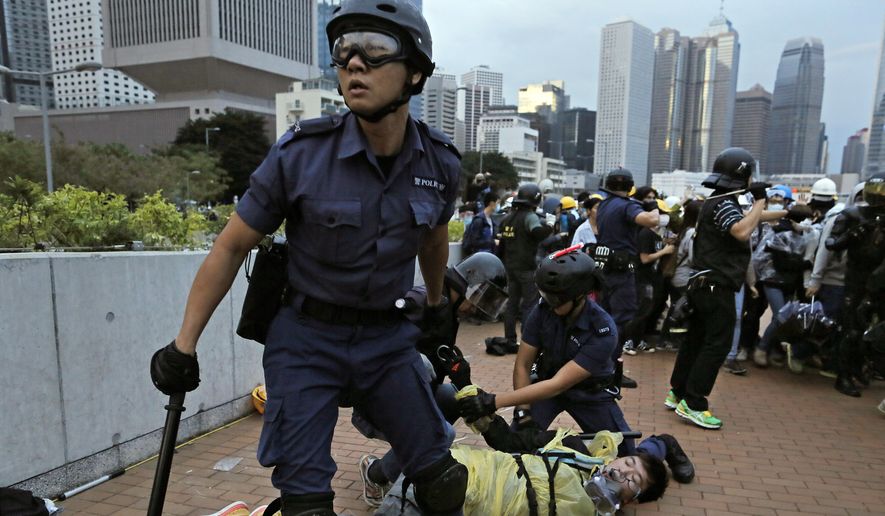SAN DIEGO — An increasingly activist Republican National Committee is expected to dive into foreign policy once again with the passage of a resolution Friday to support Hong Kong’s recent student-led demonstrations for democracy, The Washington Times has learned.
The resolution, which has been quietly making its way through the machinery of the 168-member GOP national governing body, is in part an attempt to pressure the next Republican president to honor U.S. commitments to defending the freedom of Taiwan, the island nation formally known as the Republic of China that the mainland People’s Republic of China claims as its own.
The resolution, sponsored by Helen Van Etten, a Taiwan-born naturalized American citizen who is an RNC member from Kansas, has drawn no objection from RNC Chairman Reince Priebus and apparently has the support of the vast majority of the members on the national committee.
“I want to see this resolution be a part of our RNC platform in 2016 so our next Republican president will not neglect our obligation to protect freedom and democracy for Taiwan and the South China Sea,” Ms. Van Etten told The Washington Times.
She is able to make such policy assertions because of the changing nature of the national committee.
Unlike Mr. Priebus, past chairmen generally have keep the RNC out of national policy issues and focused on broad statements of Republican principles. The RNC statements usually become planks in the GOP’s platform debated and approved at each presidential nominating convention.
“As we all can gather, China has no intention to honor [the principle of] ’one country, two systems’ in Hong Kong or maintain its autonomy,” said Mrs. Van Etten, chief audiologist for the Topeka school district in Kansas. “So I realize it is Hong Kong ’s freedom at stake today; tomorrow it could be Taiwan’s time to lose its freedom and democracy under this formula for reunification.”
Mrs. Van Etten’s cause has support among conservatives and others well beyond the RNC, and it explicitly supports bipartisan bills in the Senate and House in defense of Taiwan. But such support often carries reservations in foreign policy circles across the political spectrum.
“We certainly want to make clear to China in all of our communications that we will aggressively defend traditional U.S. interests in the region,” said Jeremy Carl, a research fellow at the conservative Hoover Institution who follows U.S. policy in Asia and who gave his qualified support for Mrs. Van Etten’s resolution. “The people most likely to read this and pay attention to it are the Chinese on the mainland, who will doubtless be irritated by it.”
Under the 1979 Taiwan Relations Act signed by President Carter, the U.S. withdrew recognition of Taiwan as a nation and instead recognized the People’s Republic as the sole legal government of all of China. Washington thus explicitly acknowledged the mainland communist government’s claim that Taiwan is part of communist China.
Though a minority of lawmakers in both the Democratic and Republican parties condemned the deal as the sellout of an ally, it was the price GOP and Democratic presidents from Richard Nixon to Barack Obama felt they had to pay for good relations with the military and economic behemoth in Beijing, a rapidly growing power which has over time become the biggest holder of U.S. financial debt.
Great Britain under Margaret Thatcher similarly turned over its prosperous democratic former colony of Hong Kong to mainland China in 1997, in similar acknowledgement of the power of the Beijing government.
At the same time, in what critics regarded as an example of monumental diplomatic convolution, Washington has said that maintaining “strong, unofficial relations with Taiwan is a major U.S. goal, in line with the U.S. desire to further peace and stability in Asia.”
The 1979 Taiwan Relations Act established a U.S. commitment to Taiwan’s defense and opposed “unilateral changes to the status quo by either side.”
Taiwan lies only 110 miles from the Chinese mainland across the Formosa Straight. Hong Kong is on the mainland’s southern coast, 500 miles from Taiwan.
Tensions have been growing between Hong Kong and Beijing over the former’s right to select its own chief executive and legislature and between Taiwan and China over Taiwan’s growing drive for permanent independence.
Since Nixon’s diplomatic opening to China in 1972, the U.S. generally has refused to fully meet Taiwan’s request for arms to defend itself against a military takeover by Beijing.
For Hoover’s Mr. Carl, the prospect that resolutions like Mrs. Etten’s will amount to empty rhetoric at one extreme or self-defeating dictates for unachievable goals at the other, revives Cold War echoes of the U.S. failure to aid Hungarian freedom fighters who rose up against Soviet domination in 1956 and Czechs who launched the Prague Spring 12 years later.
“The question is: What are we actually going to do if China ignores the noble sentiments expressed here?” Mr. Carl said. “If we are all talk and no action, we’ll just be replicating the feckless Obama foreign policy. If we are going to talk tough in our resolutions, we had better be prepared to back that toughness up.”
And, he added, “we had better know precisely what other interests in our relationship with China we are willing to sacrifice to push this stand in the party’s platform.”
• Ralph Z. Hallow can be reached at rhallow@gmail.com.




Please read our comment policy before commenting.